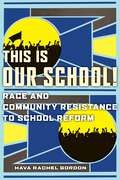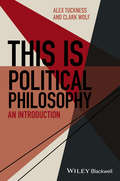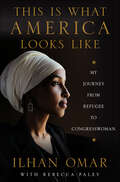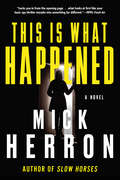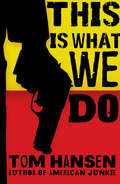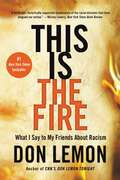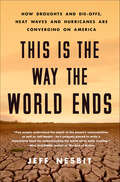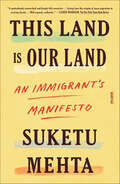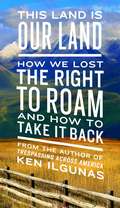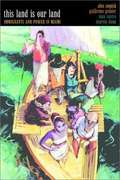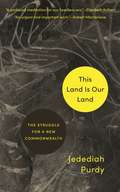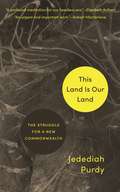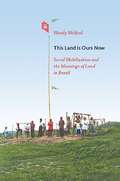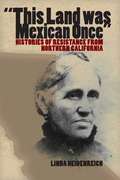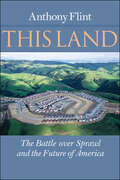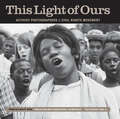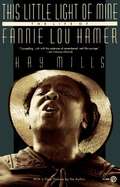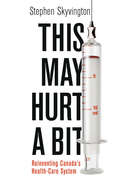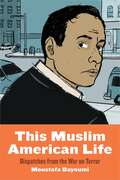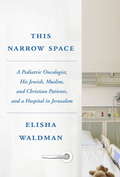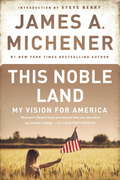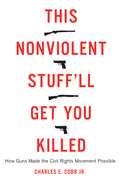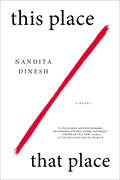- Table View
- List View
This Is Our School!: Race and Community Resistance to School Reform
by Hava Rachel GordonHow local educational justice movements wrestle with neoliberal school reformParents, educators, and activists are passionately fighting to improve public schools around the country. In This Is Our School! Hava Rachel Gordon takes us inside these fascinating school reform movements, exploring their origins, aims, and victories as they work to build a better future for our education system.Focusing on a school district in Denver, Colorado, Gordon takes a look at different coalitions within the school reform movement, as well as the surprising competition that arises between them. Drawing on over eighty interviews and ethnographic research, she explores how these groups vie for power, as well as the role that race, class, and gentrification play in shaping their successes and failures, strategies and structures. Gordon shows us what happens when people mobilizefrom the ground up and advocate for educational change. This Is Our School! gives us an inside look at the diverse voices within the school reform movement, each of which plays an important role in the fight to improve public education.
This Is Political Philosophy: An Introduction
by Alex Tuckness Clark WolfPolitical Philosophy, First Edition is an accessible and well-balanced introduction to the main issues in political philosophy written by an author team from the fields of both philosophy and politics. This text connects issues at the core of political philosophy with current, live debates in policy, politics, and law and addresses different ideals of political organization, such as democracy, liberty, equality, justice, and happiness. Written with great clarity, Political Philosophy, First Edition is accessible and engaging to those who have little or no prior knowledge of political philosophy and is supported with supplemental pedagogical and instructor material on the This Is Philosophy series site.
This Is What America Looks Like: My Journey from Refugee to Congresswoman
by Ilhan OmarNamed a Best Political Book of the Year by The Atlantic“This Is What America Looks Like is the origin story of a leader who, finding no set path that would take a person like her to the places she wanted to go, was forced, and free, to chart her own.” –The New York Times Book Review"Ilhan has been an inspiring figure well before her time in Congress. This book will give you insight into the person and sister that I see—passionate, caring, witty, and above all committed to positive change. It's an honor to serve alongside her in the fight for a more just world." —Congresswoman Alexandria Ocasio-CortezAn intimate and rousing memoir by progressive trailblazer Ilhan Omar—the first African refugee, the first Somali-American, and one of the first Muslim women, elected to Congress.Ilhan Omar was only eight years old when war broke out in Somalia. The youngest of seven children, her mother had died while Ilhan was still a little girl. She was being raised by her father and grandfather when armed gunmen attacked their compound and the family decided to flee Mogadishu. They ended up in a refugee camp in Kenya, where Ilhan says she came to understand the deep meaning of hunger and death. Four years later, after a painstaking vetting process, her family achieved refugee status and arrived in Arlington, Virginia.Aged twelve, penniless, speaking only Somali and having missed out on years of schooling, Ilhan rolled up her sleeves, determined to find her American dream. Faced with the many challenges of being an immigrant and a refugee, she questioned stereotypes and built bridges with her classmates and in her community. In under two decades she became a grassroots organizer, graduated from college and was elected to congress with a record-breaking turnout by the people of Minnesota—ready to keep pushing boundaries and restore moral clarity in Washington D.C.A beacon of positivity in dark times, Congresswoman Omar has weathered many political storms and yet maintained her signature grace, wit and love of country—all the while speaking up for her beliefs. Similarly, in chronicling her remarkable personal journey, Ilhan is both lyrical and unsentimental, and her irrepressible spirit, patriotism, friendship and faith are visible on every page. As a result, This is What America Looks Like is both the inspiring coming of age story of a refugee and a multidimensional tale of the hopes and aspirations, disappointments and failures, successes, sacrifices and surprises, of a devoted public servant with unshakable faith in the promise of America.
This Is What Happened
by Mick HerronFrom CWA Gold Dagger winner Mick Herron comes a shocking, twisted novel of psychological suspense about one woman's attempt to be better than ordinary. Twenty-six-year-old Maggie Barnes is someone you would never look at twice. Living alone in a month-to-month sublet in the huge city of London, with no family but an estranged sister, no partner, and not much in the way of friends, Maggie is just the kind of person who could vanish from the face of the earth without anyone taking notice. Or just the kind of person MI5 needs to infiltrate the establishment and thwart an international plot that puts all of Britain at risk. Now one young woman has the chance to be a hero—if she can think quickly enough to stay alive.
This Is What We Do
by Tom HansenJames Nethery is in a crisis. It's not the first time the facade of his comfortable life has crumbled, but this time it's for good. On a whim he bolts to Paris. Alone, he wanders the streets until he meets Lily, a blacklisted Ukrainian model who is coming to her own painful realizations. A moment of unexpected violence changes everything, unleashing a chain of events that involves them in drugs and an emerging global revolution. Together they must decide between justice and vengeance, and, when forced to take action, between what is too much - and not enough.
This Is the Fire: What I Say to My Friends About Racism
by Don LemonIn this ‘vital book for these times’ (Kirkus Reviews), Don Lemon brings his vast audience and experience as a reporter and a Black man to today’s most urgent question: How can we end racism in America in our lifetimes? The host of CNN Tonight with Don Lemon is more popular than ever. <P><P>As America’s only Black prime-time anchor, Lemon and his daily monologues on racism and antiracism, on the failures of the Trump administration and of so many of our leaders, and on America’s systemic flaws speak for his millions of fans. Now, in an urgent, deeply personal, riveting plea, he shows us all how deep our problems lie, and what we can do to begin to fix them. <P><P>Beginning with a letter to one of his Black nephews, he proceeds with reporting and reflections on his slave ancestors, his upbringing in the shadows of segregation, and his adult confrontations with politicians, activists, and scholars. In doing so, Lemon offers a searing and poetic ultimatum to America. He visits the slave port where a direct ancestor was shackled and shipped to America. He recalls a slave uprising in Louisiana, just a few miles from his birthplace. And he takes us to the heart of the 2020 protests in New York City. As he writes to his young nephew: We must resist racism every single day. We must resist it with love. <P><P><b>A New York Times Best Seller</b>
This Is the Way the World Ends: How Droughts and Die-Offs, Heat Waves and Hurricanes Are Converging on America
by Jeff NesbitBustle's "17 Best Nonfiction Books Coming Out In September 2018""With This is the Way the World Ends Jeff Nesbit has delivered an enlightening - and alarming - explanation of the climate challenge as it exists today. Climate change is no far-off threat. It's impacting communities all over the world at this very moment, and we ignore the scientific reality at our own peril. The good news? As Nesbit underscores, disaster is not preordained. The global community can meet this moment — and we must." —Senator John KerryA unique view of climate change glimpsed through the world's resources that are disappearing.The world itself won’t end, of course. Only ours will: our livelihoods, our homes, our cultures. And we’re squarely at the tipping point.Longer droughts in the Middle East. Growing desertification in China and Africa. The monsoon season shrinking in India. Amped-up heat waves in Australia. More intense hurricanes reaching America. Water wars in the Horn of Africa. Rebellions, refugees and starving children across the globe. These are not disconnected events. These are the pieces of a larger puzzle that environmental expert Jeff Nesbit puts together Unless we start addressing the causes of climate change and stop simply navigating its effects, we will be facing a series of unstoppable catastrophes by the time our preschoolers graduate from college. Our world is in trouble – right now. This Is the Way the World Ends tells the real stories of the substantial impacts to Earth’s systems unfolding across each continent. The bad news? Within two decades or so, our carbon budget will reach a point of no return. But there’s good news. Like every significant challenge we’ve faced—from creating civilization in the shadow of the last ice age to the Industrial Revolution—we can get out of this box canyon by understanding the realities and changing the worn-out climate conversation to one that’s relevant to every person. Nesbit provides a clear blueprint for real-time, workable solutions we can tackle together.
This Land Is Our Land: An Immigrant's Manifesto
by Suketu MehtaA 2019 NPR Staff Pick“Written ‘in sorrow and anger,’ this is a brilliant and urgently necessary book, eloquently making the case against bigotry and for all of us migrants—what we are not, who we are, and why we deserve to be welcomed, not feared.” —Salman RushdieA timely argument for why the United States and the West would benefit from accepting more immigrantsThere are few subjects in American life that prompt more discussion and controversy than immigration. But do we really understand it? In This Land Is Our Land, the renowned author Suketu Mehta attacks the issue head-on. Drawing on his own experience as an Indian-born teenager growing up in New York City and on years of reporting around the world, Mehta subjects the worldwide anti-immigrant backlash to withering scrutiny. As he explains, the West is being destroyed not by immigrants but by the fear of immigrants. Mehta juxtaposes the phony narratives of populist ideologues with the ordinary heroism of laborers, nannies, and others, from Dubai to Queens, and explains why more people are on the move today than ever before. As civil strife and climate change reshape large parts of the planet, it is little surprise that borders have become so porous. But Mehta also stresses the destructive legacies of colonialism and global inequality on large swaths of the world: When today’s immigrants are asked, “Why are you here?” they can justly respond, “We are here because you were there.” And now that they are here, as Mehta demonstrates, immigrants bring great benefits, enabling countries and communities to flourish. Impassioned, rigorous, and richly stocked with memorable stories and characters, This Land Is Our Land is a timely and necessary intervention, and a literary polemic of the highest order.
This Land Is Our Land: How We Lost the Right to Roam and How to Take It Back
by Ken IlgunasPrivate property is everywhere. Almost anywhere you walk in the United States, you will spot “No Trespassing” and “Private Property” signs on trees and fence posts. In America, there are more than a billion acres of grassland pasture, cropland, and forest, and miles and miles of coastlines that are mostly closed off to the public. Meanwhile, America’s public lands are threatened by extremist groups and right-wing think tanks who call for our public lands to be sold to the highest bidder and closed off to everyone else. If these groups get their way, public property may become private, precious green spaces may be developed, and the common good may be sacrificed for the benefit of the wealthy few.Ken Ilgunas, lifelong traveler, hitchhiker, and roamer, takes readers back to the nineteenth century, when Americans were allowed to journey undisturbed across the country. Today, though, America finds itself as an outlier in the Western world as a number of European countries have created sophisticated legal systems that protect landowners and give citizens generous roaming rights to their countries' green spaces. Inspired by the United States' history of roaming, and taking guidance from present-day Europe, Ilgunas calls into question our entrenched understanding of private property and provocatively proposes something unheard of: opening up American private property for public recreation. He imagines a future in which folks everywhere will have the right to walk safely, explore freely, and roam boldly—from California to the New York island, from the Redwood Forest to the Gulf Stream waters.
This Land Is Our Land: Immigrants and Power in Miami
by Alex Stepick Max J. Castro Marvin Dunn Guillermo GrenierWith vivid ethnographic detail, this book analyzes power, immigration, and inter-ethnic relations in Miami, Florida.
This Land Is Our Land: The Struggle for a New Commonwealth
by Jedediah PurdyFrom one of our finest writers and leading environmental thinkers, a powerful book about how the land we share divides us—and how it could unite usToday, we are at a turning point as we face ecological and political crises that are rooted in conflicts over the land itself. But these problems can be solved if we draw on elements of our tradition that move us toward a new commonwealth—a community founded on the well-being of all people and the natural world. In this brief, powerful, timely, and hopeful book, Jedediah Purdy, one of our finest writers and leading environmental thinkers, explores how we might begin to heal our fractured and contentious relationship with the land and with each other.From the coalfields of Appalachia and the tobacco fields of the Carolinas to the public lands of the West, Purdy shows how the land has always united and divided Americans, holding us in common projects and fates but also separating us into insiders and outsiders, owners and dependents, workers and bosses. Expropriated from Native Americans and transformed by slave labor, the same land that represents a history of racism and exploitation could, in the face of environmental catastrophe, bind us together in relationships of reciprocity and mutual responsibility.This may seem idealistic in our polarized time, but we are at a historical fork in the road, and if we do not make efforts now to move toward a commonwealth, Purdy warns, environmental and political pressures will create harsher and crueler conflicts—between citizens, between countries, and between humans and the rest of the world.
This Land Is Our Land: The Struggle for a New Commonwealth
by Jedediah PurdyFrom one of our finest writers and leading environmental thinkers, a powerful book about how the land we share divides us—and how it could unite usToday, we are at a turning point as we face ecological and political crises that are rooted in conflicts over the land itself. But these problems can be solved if we draw on elements of our tradition that move us toward a new commonwealth—a community founded on the well-being of all people and the natural world. In this brief, powerful, timely, and hopeful book, Jedediah Purdy explores how we might begin to heal our fractured and contentious relationship with the land and with each other.
This Land Is Ours Now: Social Mobilization and the Meanings of Land in Brazil
by Wendy WolfordIn This Land Is Ours Now, Wendy Wolford presents an original framework for understanding social mobilization. She argues that social movements are not the politically coherent, bounded entities often portrayed by scholars, the press, and movement leaders. Instead, they are constantly changing mediations between localized moral economies and official movement ideologies. Wolford develops her argument by analyzing how a particular social movement works: Brazil's Rural Landless Workers' Movement, known as the Movimento Sem Terra (MST). Founded in the southernmost states of Brazil in the mid-1980s, this extraordinary grassroots agrarian movement grew dramatically in the ensuing years. By the late 1990s it was the most dynamic, well-organized social movement in Brazilian history. Drawing on extensive ethnographic research, Wolford compares the development of the movement in Brazil's southern state of Santa Catarina and its northeastern state of Pernambuco. As she explains, in the south, most of the movement's members were sons and daughters of small peasant farmers; in the northeast, they were almost all former plantation workers, who related awkwardly to the movement's agenda of accessing "land for those who work it. " The MST became an effective presence in Pernambuco only after the local sugarcane economy had collapsed. Worldwide sugarcane prices dropped throughout the 1990s, and by 1999 the MST was a prominent political organizer in the northeastern plantation region. Yet fewer than four years later, most of the region's workers had dropped out of the movement. By delving into the northeastern workers' motivations for joining and then leaving the MST, Wolford adds nuance and depth to accounts of a celebrated grassroots social movement, and she highlights the contingent nature of social movements and political identities more broadly.
This Land Was Mexican Once: Histories of Resistance from Northern California
by Linda HeidenreichThe territory of Napa County, California, contains more than grapevines. The deepest roots belong to Wappo-speaking peoples, a group whose history has since been buried by the stories of Spanish colonizers, Californios (today's Latinos), African Americans, Chinese immigrants, and Euro Americans. Napa's history clearly is one of co-existence; yet, its schoolbooks tell a linear story that climaxes with the arrival of Euro Americans. In "This Land was Mexican Once," Linda Heidenreich excavates Napa's subaltern voices and histories to tell a complex, textured local history with important implications for the larger American West, as well.
This Land: The Battle over Sprawl and the Future of America
by Anthony FlintDespite a modest revival in city living, Americans are spreading out more than ever—into "exurbs" and "boomburbs" miles from anywhere, in big houses in big subdivisions. We cling to the notion of safer neighborhoods and better schools, but what we get, argues Anthony Flint, is long commutes, crushing gas prices and higher taxes—and a landscape of strip malls and office parks badly in need of a makeover.This Land tells the untold story of development in America—how the landscape is shaped by a furious clash of political, economic and cultural forces. It is the story of burgeoning anti-sprawl movement, a 1960s-style revolution of New Urbanism, smart growth, and green building. And it is the story of landowners fighting back on the basis of property rights, with free-market libertarians, homebuilders, road pavers, financial institutions, and even the lawn-care industry right alongside them.The subdivisions and extra-wide roadways are encroaching into the wetlands of Florida, ranchlands in Texas, and the desert outside Phoenix and Las Vegas. But with up to 120 million more people in the country by 2050, will the spread-out pattern cave in on itself? Could Americans embrace a new approach to development if it made sense for them?A veteran journalist who covered planning, development, and housing for the Boston Globe for sixteen years and a visiting scholar in 2005 at the Harvard Design School, Flint reveals some surprising truths about the future and how we live in This Land.
This Land: The Battle over Sprawl and the Future of America
by Anthony FlintAn expert in American housing examines the rise of sprawling subdivisions, their effect on the environment, and sustainable development strategies.Americans are spreading out more than ever—into “exurbs” and “boomburbs” miles from anywhere, where big subdivisions offer big houses. We cling to the notion of safer neighborhoods and better schools, but what we get are longer commutes, higher taxes, and a landscape of strip malls and office parks.The subdivisions and extra-wide roadways are encroaching into the wetlands of Florida, ranchlands in Texas, and the desert outside Phoenix and Las Vegas. But with up to 120 million more people in the country by 2050, will the spread-out pattern cave in on itself? Could Americans embrace a new approach to development?In This Land, veteran journalist and Harvard scholar Anthony Flint tells the untold story of development in America. It is the story of a burgeoning anti-sprawl movement, a 1960s-style revolution of New Urbanism, smart growth, and green building. And it is the story of landowners fighting back on the basis of property rights, with free-market libertarians, homebuilders, road pavers, financial institutions, and even the lawn-care industry right alongside them.
This Land: The Story Of A Movement
by Owen JonesThe number one best-selling author of Chavs and The Establishment returns with an urgent, revelatory account of where the left - and Britain - goes next. On 12th December 2019, the left died. That at least was the view of much of Britain's media and political establishment, who saw the electoral defeat of Jeremy Corbyn's Labour Party as the damning repudiation of everything it stood for. Yet, just over four years previously, the election of Corbyn as Labour leader seemed like a sea-change in politics: reanimating not just a party in apparently terminal decline but a country adrift, with a transformative vision based on a more just, more equal society and economy. In this revelatory new book, Owen Jones explores how these ideas took hold, how they promised to change the nature of British politics - and how everything then went profoundly, catastrophically wrong. Why did the left fail so badly? Where, in this most critical of times, does that failure leave its values and ideas? Where does it leave Britain itself?
This Light of Ours: Activist Photographers of the Civil Rights Movement
by Clayborne Carson Charles E. Jr. Matt HerronThis Light of Ours: Activist Photographers of the Civil Rights Movement is a paradigm-shifting publication that presents the Civil Rights Movement through the work of nine photographers who participated in the movement as activists with SNCC, SCLC, and CORE. Unlike images produced by photojournalists, who covered breaking news events, these photographers lived within the movement—primarily within the Student Nonviolent Coordinating Committee (SNCC) framework—and documented its activities by focusing on the student activists and local people who together made it happen. The core of the book is a selection of 150 black-and-white photographs, representing the work of photographers Bob Adelman, George Ballis, Bob Fitch, Bob Fletcher, Matt Herron, David Prince, Herbert Randall, Maria Varela, and Tamio Wakayama. Images are grouped around four movement themes and convey SNCC's organizing strategies, resolve in the face of violence, impact on local and national politics, and influence on the nation's consciousness. The photographs and texts of This Light of Ours remind us that the movement was a battleground, that the battle was successfully fought by thousands of “ordinary” Americans among whom were the nation's courageous youth, and that the movement's moral vision and impact continue to shape our lives.
This May Hurt a Bit: Reinventing Canada's Health Care System
by Stephen Skyvington Dr Brian DaySome painful news: Canada no longer has the best health-care system in the world. How might we fix Canada’s health-care system? Why would we want to? What’s stopping us from doing so? These three questions lie at the heart of this in-depth exploration of one of the biggest political and personal issues facing Canadians. Skyvington explains why change has to occur, in light of the implications of doing nothing, and describes how Canadians can and must get involved to save our health-care system. This May Hurt a Bit is meant to provide a blueprint for change once those in charge finally acknowledge the most inconvenient truth — namely, that Canada’s health-care system is in poor health.
This Muslim American Life: Dispatches from the War on Terror
by Moustafa BayoumiWinner of the 2016 Evelyn Shakir Non-Fiction Arab American Book AwardA collection of insightful and heartbreaking essays on Muslim-American life after 9/11Over the last few years, Moustafa Bayoumi has been an extra in Sex and the City 2 playing a generic Arab, a terrorist suspect (or at least his namesake “Mustafa Bayoumi” was) in a detective novel, the subject of a trumped-up controversy because a book he had written was seen by right-wing media as pushing an “anti-American, pro-Islam” agenda, and was asked by a U.S. citizenship officer to drop his middle name of Mohamed.Others have endured far worse fates. Sweeping arrests following the terrorist attacks of September 11, 2001 led to the incarceration and deportation of thousands of Arabs and Muslims, based almost solely on their national origin and immigration status. The NYPD, with help from the CIA, has aggressively spied on Muslims in the New York area as they go about their ordinary lives, from noting where they get their hair cut to eavesdropping on conversations in cafés. In This Muslim American Life, Moustafa Bayoumi reveals what the War on Terror looks like from the vantage point of Muslim Americans, highlighting the profound effect this surveillance has had on how they live their lives. To be a Muslim American today often means to exist in an absurd space between exotic and dangerous, victim and villain, simply because of the assumptions people carry about you. In gripping essays, Bayoumi exposes how contemporary politics, movies, novels, media experts and more have together produced a culture of fear and suspicion that not only willfully forgets the Muslim-American past, but also threatens all of our civil liberties in the present.
This Narrow Space: A Pediatric Oncologist, His Jewish, Muslim, and Christian Patients, and aHospital in Jerusalem
by Elisha WaldmanA memoir both bittersweet and inspiring by an American pediatric oncologist who spent seven years in Jerusalem treating children—Israeli Jews, Muslims, and Christians, and Palestinian Arabs from the West Bank and Gaza—who had all been diagnosed with cancer. In 2007, Elisha Waldman, a New York–based doctor in his mid-thirties, was offered his dream job: attending physician at Jerusalem’s Hadassah Medical Center. He had gone to medical school in Israel and spent time there as a teenager; now he was going to give something back to the land he loved. But in the wake of a financial crisis at the hospital, Waldman, with considerable regret, left Hadassah in 2014 and returned to the United States. This Narrow Space is his poignant memoir of seven years that were filled with a deep sense of accomplishment but also with frustration when regional politics got in the way of his patients’ care, and with tension over the fine line he had to walk when the religious traditions of some of his patients’ families made it difficult for him to give those children the care he felt they deserved. Navigating the baffling Israeli bureaucracy, the ever-present threat of full-scale war, and the cultural clashes that sometimes spilled into his clinic, Waldman learned to be content with small victories: a young patient whose disease went into remission, brokenhearted parents whose final hours with their child were made meaningful and comforting. Waldman also struggled with his own questions of identity and belief, and with the intractable conflict between Israelis and Palestinians that had become a fact of his daily life. What he learned about himself, about the complex country that he was now a part of, and about the brave and endearing children he cared for—whether they were from Rehavia, Me’ah She’arim, Ramallah, or Gaza City—will move and challenge readers everywhere.
This Noble Land
by James A. MichenerIn such modern classics as Chesapeake, Centennial, Hawaii, Alaska, and Texas, James A. Michener proved time and again that his understanding of and love for his country was unparalleled. This Noble Land is Michener's most personal statement about America, an examination of the issues that threaten to fragment and undermine the nation--racial conflict, the widening gulf between rich and poor, the decline of education, the inadequacies of our health care system--as well as a thought-provoking prescription for sustaining our "outstanding success." First published shortly before Michener's death, This Noble Land stands as a wake-up call for a troubled era, infused with the wisdom and passion of a lifetime. Praise for This Noble Land "A book-length essay on the often worrying, often inspiring course of America in the nine decades of Michener's life."--The Washington Post "Michener is more interested in fixing the problems than in fixing the blame."--The Dallas Morning News "Michener's are the beach books that, unlike most other beach books, leave you smarter than you were when you started reading. Each delivers the product of all that research, doled out to the reader at just the right rate. You know right away who the bad guys are--the petty ones, the stingy ones. The heroes are generous and energetic and smart and, above all, unprejudiced. The real-life villains in This Noble Land are the people Michener perceives as 'petty, mean and vengeful.'"--St. Louis Post-Dispatch "Stirring . . . an admirable effort to define what has made our country great and how to preserve what is best about it."--Kirkus ReviewsFrom the Trade Paperback edition.
This Nonviolent Stuff'll Get You Killed: How Guns Made the Civil Rights Movement Possible
by Charles E. CobbVisiting Martin Luther King, Jr. at the peak of the civil rights movement, the journalist William Worthy almost sat on a loaded pistol. "Just for self-defense,” King assured him. One of King’s advisors remembered the reverend’s home as "an arsenal. ” Like King, many nonviolent activists embraced their constitutional right to self-protection-yet this crucial dimension of the civil rights struggle has been long ignored. In This Nonviolent Stuff’ll Get You Killed, civil rights scholar Charles E. Cobb, Jr. reveals how nonviolent activists and their allies kept the civil rights movement alive by bearing-and, when necessary, using-firearms. Whether patrolling their neighborhoods, garrisoning their homes, or firing back at attackers, these men and women were crucial to the movement’s success, as were the weapons they carried. Drawing on his firsthand experiences in the Southern Freedom Movement and interviews with fellow participants, Cobb offers a controversial examination of the vital role guns have played in securing American liberties.
This Place That Place
by Nandita DineshAn impassioned and inventive debut novel about two people earnestly searching for a way to preserve their friendship across seemingly insurmountable political divides...IN A NAMELESS COUNTRY under military occupation, two friends prepare to attend a wedding. The young man is from the occupied region (&“This Place&”), the woman is from the occupying nation-state (&“That Place&”). The complicated relationship between these two protagonists with unusual professions—he is a Protest Designer and she is a De-programmer—is tested when, on the eve of the wedding, the occupying power, That Place, formally annexes This Place and declares a curfew. Suddenly finding themselves confined to the same isolated space, the young woman and man try to kill time but inevitably wind up talking about the ways in which the war between their homelands pervades the unexplored and undeniable attraction between them. Will their relationship become another casualty of war? This Place | That Place is an evocative debut that functions as a bold allegory for militarized occupations anywhere. As much a visual read as it is a literary one, this brilliant literary debut provides new ways to think about the intersections between the personal and the political; between occupier and occupied; between the kinds of bonds that endure, and those that have no choice but to fracture.
